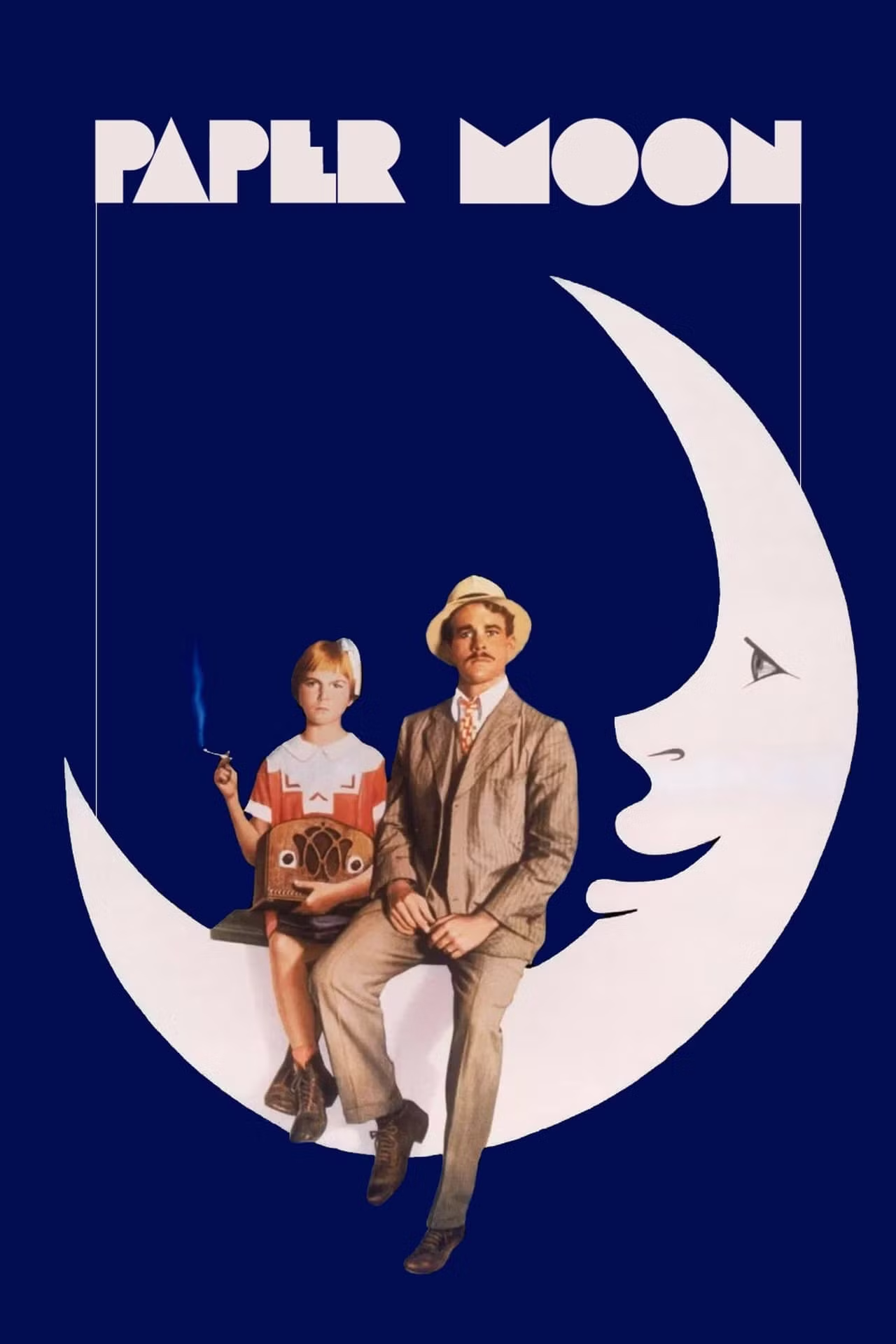Cinema would be a slightly less exciting place if every movie was only allowed to fit within one genre. Would Casablanca be compelling as just a romance movie without also being a World War II drama? How would Jackie Chan have fared if he couldn’t do comedy and action at the same time? Could any multiverse-hopping even happen if Everything Everywhere All at Once was just One Thing in One Place at One Time?
Since the silent era, it’s been apparent that, in the right hands, a film can be both funny and emotional. Enter the comedy-drama, or a dramedy, which is exactly what you’d expect: a movie that’s a comedy and a drama at the same time. The following films are some of the very best that managed to pull this off, maybe even reflecting the idea that life can be a tragedy to those who feel and a comedy to those who think.
10
‘Paper Moon’ (1973)
Directed by Peter Bogdanovich
While it’s set during the Great Depression, Paper Moon thankfully isn’t entirely depressing. It’s a film that can be sad at times in a fairly quiet way, but there’s also a good deal of comedy here with a story about an unlikely team of con artists trying to get by in desperate times: one being a lone salesman, and the other being a young girl who might be his daughter.
Paper Moon is a tonally odd film, but something about it works strikingly well. Also, it came out at a time when Peter Bogdanovich was on something of a hot streak as a filmmaker. Two years earlier, he made a grim drama (The Last Picture Show), and one year earlier, he’d made a screwball comedy (What’s Up Doc?). Paper Moon is somewhere in the middle tonally, and it still holds up as a classic of the 1970s.

Paper Moon
- Release Date
-
May 9, 1973
- Runtime
-
102 Minutes
- Writers
-
Joe David Brown, Alvin Sargent
9
‘The Grand Budapest Hotel’ (2014)
Directed by Wes Anderson
Wes Anderson is famously good at doing several things with just about every new film. He can assemble remarkable casts (Bill Murray usually included), he continues to double down on his unique visual style, and he makes films with stories that are emotionally varied, often fluctuating between high-impact comedy and genuinely moving drama.
Picking just one film of his to showcase his skill at making dramedies is difficult, but maybe The Grand Budapest Hotel is the best pick. It tells a large-scale story but also centers on two key characters throughout, and the whole thing gleefully jumps between comedy, heartbreak, and excitement throughout. It’s more than just a comedy-drama, sure, but as far as being both funny and dramatic go, The Grand Budapest Hotel really succeeds.
8
‘Little Miss Sunshine’ (2006)
Directed by Valerie Faris and Jonathan Dayton
A movie about a family filled with people who are struggling, Little Miss Sunshine can get understandably heavy at times. Few of them come close to being in “good” places when viewers meet them at the start of the film, but they do band together for a common goal: traveling to California so that the youngest member of the family can take part in a beauty pageant.
So, Little Miss Sunshine is a road trip movie, and it finds a good deal of humorous situations along the way to throw the characters into. But then when things get heavy, or someone breaks down emotionally, Little Miss Sunshine effectively shifts gears and treats those moments with respect. It’s a remarkably well-balanced movie emotionally, even if the narrative itself is sometimes chaotic, and all that adds up to something that’s hard to come away from unmoved.
7
‘In Bruges’ (2008)
Directed by Martin McDonagh
For a good chunk of its runtime, In Bruges feels like a pure comedy, albeit one with a lot of swearing and some occasionally morbid topics that get talked about. Its premise sees two hitmen waiting around in Bruges, Belgium for word from their superior. One of them hates Bruges, and complains about it constantly. The conversations are wittily written and usually very funny.
Then, at one stage, In Bruges shifts. There are dark truths revealed about the past of one character, and then things escalate; eventually, it no longer feels anything like a hangout movie. The more drama-heavy/crime-focused parts of In Bruges are just as effective as the more comedic sequences, and the jump from one tonal extreme to another works far better than you’d ordinarily expect it to.

In Bruges
- Release Date
-
February 8, 2008
- Runtime
-
107minutes
6
‘Ed Wood’ (1994)
Directed by Tim Burton
Edward Davis Wood Jr. was famously behind some of the most infamously bad movies of all time, but some of his work remains oddly entertaining, even if not for the reasons he might’ve intended. As a result, maybe it’s fitting that a biographical movie about such a director is pretty funny at times… though that biopic isn’t entirely a laugh riot from start to finish.
The film about Ed Wood in question is called, fittingly, Ed Wood, and it’s pretty outstanding as far as biopics go. It explores what made some of the filmmaker’s work so funny while still treating him like a human being, and unpacking some of the sadder aspects of his life, too. It’s a film that sees Tim Burton at his arguable best, even if Ed Wood might not be quite as popular as some other movies of his, like Beetlejuice and Batman (1989).

Ed Wood
- Release Date
-
October 7, 1994
- Runtime
-
127 minutes
- Writers
-
Scott Alexander, Larry Karaszewski
5
‘The Apartment’ (1960)
Directed by Billy Wilder
One of those filmmakers who did a bit of everything and could always surprise (when he wanted to), Billy Wilder didn’t consistently make perfect movies, but he made so many great ones that the occasional dud can be easily overlooked. The Apartment is easily one of his very best, too, with a premise that involves one lowly office worker going to great lengths to get the higher-ups to like him.
Though it’s not racy by today’s standards, some of the stuff that The Apartment gets away with exploring is surprising considering it was released in 1960, but Wilder continually got away with a lot for his time. The Apartment is probably a bit more of a comedy than a drama, too, but there are serious things it explores alongside all the farcical stuff, all the while being a very sympathetic movie towards its two lead characters (played by Jack Lemmon and Shirley MacLaine).
4
‘The Truman Show’ (1998)
Directed by Peter Weir
So, as mentioned, The Apartment is probably more of a comedy than a drama, but The Truman Show is probably a little more dramatic than it is comedic. This might be surprising, considering famed comedic actor Jim Carrey is in the lead role here, but he gets to do a great deal more than “just” be funny here (and this was a few years before Eternal Sunshine of the Spotless Mind), as he plays someone who is going about their life unaware that it’s all being televised.
What might’ve felt like a sci-fi premise some time ago no longer feels that way, in the wake of reality TV and the internet allowing people to show every aspect of their lives. Still, The Truman Show hasn’t lost any of its power or relevance as a clever satirical film that’s also existentially troubling and exceedingly thought-provoking.

The Truman Show
- Release Date
-
June 5, 1998
- Runtime
-
103 minutes
- Writers
-
Andrew Niccol
3
‘La Dolce Vita’ (1960)
Directed by Federico Fellini
Functioning as an arthouse film and something of an epic at the same time, La Dolce Vita is very much of its time in some ways, and forward-thinking in other regards. It’s a film with an episodic structure and it looks at things like wealth, celebrity, the media, and the emptiness of pursuing pleasure, with the whole thing following a journalist as he has misadventures throughout Rome.
Undeniably one of the best of the best international films ever made, La Dolce Vita feels effortless regardless of what emotion it’s trying to provoke. There’s satire here, some scenes feel farcical, and others are despairing (one part of the film is even rather tragic in a very blunt and surprising way). It’s a lot to take in and process, but does prove to be an exceptionally rewarding film for those who want to take the plunge.

La Dolce Vita
- Release Date
-
April 19, 1961
- Runtime
-
174 Minutes
- Director
-
Frederico Fellini
- Writers
-
Frederico Fellini, Ennio Flaiano, Tullio Pinelli
2
‘The Graduate’ (1967)
Directed by Mike Nichols
The Graduate finds humor and pathos in the difficult task of moving on from school/college life and trying to become a “functioning” member of society. A young man named Benjamin is the protagonist here, and though he’s intelligent, he’s also immature and more than a little aimless, with his life becoming complicated further after he starts a strange relationship with an older woman.
It probably depends on your sense of humor, but it’s very much possible to find the majority of The Graduate hilarious. There’s a discomforting quality to that humor, though, and some of that stuff’s potentially readable as drama, or at least something more serious. The ending also has a certain bleak quality to it that’s hard to overlook or laugh at, with The Graduate, overall, being cynical and honest enough to certainly have some dramatic components alongside all the expertly done cringe comedy.

The Graduate
- Release Date
-
December 21, 1967
- Runtime
-
106 minutes
- Writers
-
Calder Willingham, Buck Henry
1
‘City Lights’ (1931)
Directed by Charlie Chaplin
Few filmmakers knocked it out of the park with endings as often as Charlie Chaplin did, and the filmmaker/actor was similarly great at balancing humor, heart, and tragedy. It’s fitting, then, that most of his iconic endings encapsulate such emotional complexity, with his best films—like Modern Times, The Great Dictator, and City Lights—ending on bittersweet or otherwise tremendously moving notes.
As for the best film of his, though, it’s tough to pick, but it’s probably City Lights, at least if one wants to assess Chaplin’s ability to craft near-ideal dramedies. City Lights is romantic, sometimes hilarious, and ultimately bittersweet, and it retains its power despite its age, and even with it (almost) entirely lacking dialogue. The humor here is timeless, as is the sadness, and so it’s hard to think of too many other movies that succeed so tremendously in both categories, all the while also being expertly balanced. City Lights really is just that great.

City Lights
- Release Date
-
March 7, 1931
- Runtime
-
87 Minutes
- Director
-
Charles Chaplin
Source link












